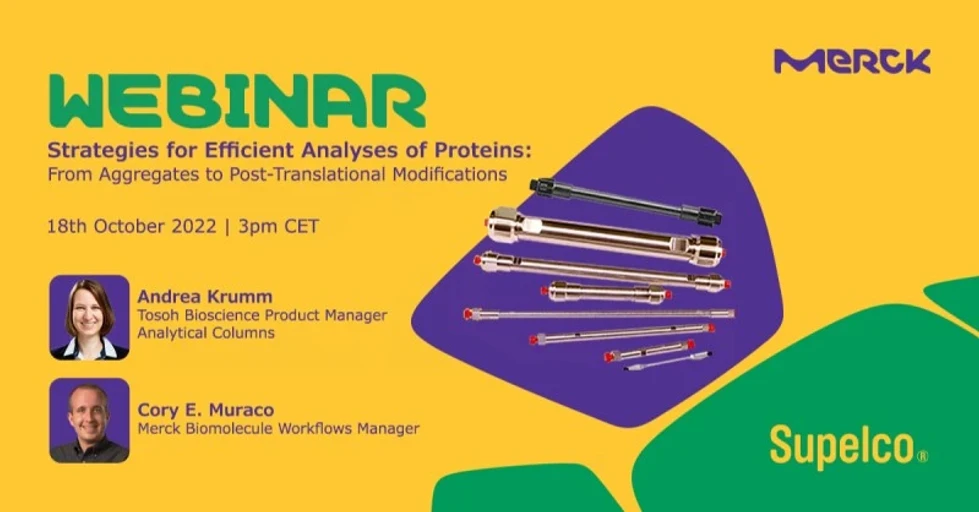Strategies for Efficient Analyses of Proteins: From Aggregates to Post-Translational Modifications

Analyzing biomacromolecules is a unique analytical challenge owing to a number of product-related impurities and the complexity of the analytes. This complexity is a result of the myriad number of modifications to these analytes in each sample including, but not limited to, phosphorylation, methylation, and glycosylation. Due to the heterogeneity of an individual analyte, in addition to a biomolecule’s tendency to interact with silica-based, reversed-phase stationary phases, the resulting chromatographic peak can exhibit extensive broadening and tailing. To further complicate matters, most large proteins do not ionize well using conventional electrospray ionization mass spectrometers. In addition, when a mixture of proteins is not well-resolved, chromatographically, prior to the mass spectrometer, further ion suppression can occur. At a higher level, sample heterogeneity also increases with aggregated and fragmented proteins. This is routinely determined by size exclusion chromatography, often lacking a deeper characterization of the impurities. Therefore, the need for highly efficient, robust, and reproducible analytical methods is not a suggestion, but a requirement, for accurate characterization of proteinaceous samples.
This seminar will focus on strategies and techniques to maximize efficiency and resolution when using reversed phase chromatography (RPC) and size exclusion chromatography (SEC) in analyzing biomacromolecules. Aspects of method development and troubleshooting will be examined for both modes of chromatography.
At the conclusion of the seminar, the engaged attendee will learn:
- How to select and the importance of phase chemistry and particle morphology in analyzing biomolecules
- Best practices in choosing appropriate mobile phase systems for each mode of chromatography
- How to diagnose the source of problems when troubleshooting biomolecule separations
Presenter: Andrea Krumm (Product Manager, Analytical Columns, Tosoh Bioscience GmbH)
Andrea Krumm studied biotechnology before gaining a PhD in cell- and cancer-biology. After four years as an applications specialist for optical analytical devices used in academic and pharmaceutical research, she joined Tosoh Bioscience GmbH in 2020 as a product manager for analytical columns. As such she is responsible for gathering customer requirements, application areas and addressing these with new and existing products of the analytical columns line.
Presenter: Cory E. Muraco (Biomolecule Workflows Manager, Merck KGaA, Darmstadt, Germany)
After finishing his graduate studies at Youngstown State University (Youngstown, Ohio, USA), Cory started his career at Merck KGaA, Darmstadt, Germany in 2013, joining the Chemical Standards R&D group where he was responsible for developing LC and GC methods for assaying the purity of Certified Reference Materials (CRMs). In 2015, Cory joined the HPLC R&D group where he was tasked with developing applications around biomolecule analysis using multiple modes of chromatography and detection techniques. In addition, Cory was responsible for developing and evaluating new stationary phase technology in the areas of both small and large molecule analysis. In 2019, Cory entered a new phase of his career, joining the marketing organization as the Global Franchise Product Manager for HPLC columns. In this role, Cory was responsible for the development and deployment of the marketing strategies around the columns supporting large molecule analyses. In 2022, Cory assumed his current role as the Biomolecule Workflows Manager where he is tasked with designing, developing, and executing the marketing and R&D strategies around the bioanalytical initiative. Cory is the author of several manuscripts appearing in trade magazines and has delivered over 100 presentations at international conferences, round table symposia, and at various pharmaceutical and biopharmaceutical companies.
